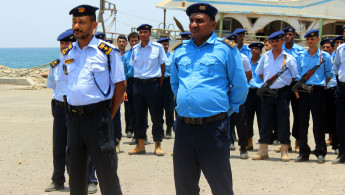UN envoy aims to bolster Yemen truce as rivals wind up Hodeida talks
"We discussed how to keep Yemen out of the regional tensions, make progress in the implementation of the Stockholm agreement (and Saudi Arabia's) support to the peace process," Griffiths wrote on Twitter.
The meeting with Prince Khaled bin Salman came as representatives from Yemen's Saudi-backed government and Iran-aligned Huthi rebels held talks on a UN vessel off the Yemeni coast to try to de-escalate tensions.
The hard-won truce agreement reached late last year in Sweden called on the Yemeni government and the Huthi rebels to pull forces out of the key port of Hodeida and parts of the city.
The pullback was supposed to have taken place two weeks after the ceasefire went into force on December 18, but that deadline was missed.
In May, the UN announced the rebels had withdrawn from Hodeida and two other nearby ports, the first practical step on the ground since the ceasefire deal.
But the government accused the militia of faking the pullout, saying it had merely handed control to allies.
On Monday, at the end of two days of talks, their first since February, a committee set up under the Sweden accord - also known as the Stockholm agreement - said it had agreed on "a mechanism and new measures to reinforce the ceasefire".
The mechanism would be put in place as soon as possible with support from the UN which is part of the committee along with representatives of the Yemeni government and Huthi rebels, a statement said.
Griffiths patches ties with Hadi
In New York, the UN Security Council voted unanimously Monday to extend its ceasefire observation mission in Hodeida by six months, until January 15.
It also called on Secretary-General Antonio Guterres to deploy a full contingent of observers "expeditiously" in the mission, which is mandated to have 75 staff but currently only has 20 on the ground.
The UN is hoping that a de-escalation in Hodeida will allow desperately-needed food and medical aid to reach millions in need in Yemen.
The Red Sea port is the entry point for the bulk of imported goods and relief aid to Yemen, which the United Nations has described as the world's worst humanitarian crisis.
On Monday, Griffith also met in Riyadh with Yemen's President Abedrabbo Mansour Hadi - their first encounter since Hadi accused him in May of siding with the Houthi rebels.
"I just concluded a meeting with President Hadi. I am grateful to him and his Government's commitment to the Stockholm agreement and his personal support to finding a political solution to the conflict in #Yemen," Griffith tweeted.
In May, Hadi took issue with Griffiths over the rebel handover of Hodeida ports and fired off a letter to UN chief Guterres saying he "can no longer accept these offences" by the UN envoy.
The Yemen conflict has killed tens of thousands of people since a Saudi-led military coalition intervened in support of the beleaguered government in March 2015, according to the World Health Organization.
The fighting has also displaced millions and left 24.1 million - more than two-thirds of the population - in need of aid.
The Sweden deal has come under further strain as the Houthis escalate drone and missile attacks on Saudi cities.
On Monday night, the coalition said it had intercepted and downed two drones launched by Huthi rebels against the southwestern Saudi city of Khamis Mushait.
There were no casualties in the incidents but only "minor damage" to a residential building and some vehicles from falling shrapnel and debris, the coalition said in a statement.
The kingdom has long accused Iran of arming the rebels, a charge denied by Tehran.





 Follow the Middle East's top stories in English at The New Arab on Google News
Follow the Middle East's top stories in English at The New Arab on Google News
![Israeli forces ordered bombed Gaza's Jabalia, ordering residents to leave [Getty]](/sites/default/files/styles/image_330x185/public/2176418030.jpeg?h=a5f2f23a&itok=_YGZaP1z)

